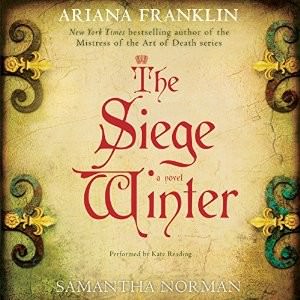 Narrated by Kate Reading
Narrated by Kate Reading
The Siege Winter is a superbly written and thoroughly enjoyable piece of historical fiction set in twelfth-century England at a time of great uncertainty and upheaval. The country is being torn apart by what is, in essence, a civil war between the supporters of the Empress Matilda (daughter of the late King Henry) and those of her cousin and Henry’s successor, King Stephen. The bulk of the tale is set between 1141 and 1143, but the story is told in the form of a story-within-a-story, as the events of the 1140s are related by a dying abbot to his scribe almost forty years later.
England in the 1140s is plagued by lawlessness, as bands of mercenaries roam the land stealing, plundering, massacring and burning. During the pandemonium surrounding the sack of Ely Cathedral, a young red-headed girl is abducted and brutally raped by someone known as “the monk”. He leaves her for dead, but she is found, barely alive, by Gwilherm de Vannes, a battle-weary soldier who saves her life and takes care of her. When she is restored to health, the girl is found to have no memory whatsoever of her past life, which Gwil knows is her mind’s way of protecting her from the memory of the brutal attack. She cuts her hair and puts on boys clothes and Gwil names her Penda.
The one thing that seems to interest Penda is archery, and Gwil teaches her how to use a bow and arrow. She has a natural talent as an archer and soon the pair of them join up with a travelling troupe of entertainers and earn their living by giving archery exhibitions. One fateful night, however, the suspicioun that Gwil has long entertained – that the monk responsible for Penda’s violation is searching for her – are brought home when a young red-headed woman from the troupe is found brutally murdered. What Penda doesn’t know is that when Gwil found her, she was in possession of a valuable document that the monk needs to recover, and that Gwil has vowed to find the monk and punish him for his heinous crime against her.
Interwoven with the story of Gwil and Pen’s growing friendship is that of Maud of Kenniford Castle, a fictional stronghold at a strategic point on the Thames in Oxfordshire. The young chatelaine has been given in marriage to a much older man as a “reward” for his service to the king. The one bright light on her horizon is in the relationship she strikes up with her husband’s young son, William, to whom she quickly becomes attached. Because of its important position on the river, Kenniford is attacked and besieged several times; during one of the attacks, Maud’s husband suffers a stroke and is incapacitated, and in order to save the castle and the lives of everyone in it, she capitulates to Matilda’s attacking forces and swears allegiance to the Empress.
Ariana Franklin (aka Diana Norman) passed away in 2011, and left this book unfinished at her death. Her daughter, Samantha Norman completed it, and one of the things that struck me immediately is that it’s impossible to “see (or hear) the join”. The book is very well written, with an incredible eye for period detail, particularly when it comes to the descriptions of the Maud’s day-to-day life as the chatelaine of a medieval castle. The characterisation of the principals – Gwil, Penda and Maud – is terrific, and the relationship that develops between Gwil and Penda is incredibly touching. He saves her life and cares for her, becoming a mentor and father figure, but she also saves him; Gwil has become hard and disillusioned over the years, and caring for Penda allows him to atone somewhat for his past sins and to feel that at last, he has done something worthwhile. It’s a lovely give-and-take dynamic. There’s the hope of romance for Lady Maud, who becomes attracted to one of the Empress’ soldiers, and I loved hearing Penda gaining confidence and courage to become a strong, independent woman who is able to face up to the horror she experienced and re-make herself and her life.
The device of framing the story of the 1140s as being told decades later also works very well, and as the story draws to a close, the listener is treated to a little twist that I didn’t see coming until the last minute. The author(s) have also fleshed out the characters of the abbot and the scribe, so that they are more than bookends to the main story; the scribe, in particular, develops from being a rather uptight, snooty individual who is annoyed that the Church could possibly think it worth his time and skill to write down the personal ramblings of the dying man to one who gradually begins to see the worth in the tale as he becomes as wrapped up in the story as the listener is.
I’ve listened to Kate Reading narrating quite a lot of historical romance recently, so I was keen to hear what she would make of a different type of historical – and of course, she doesn’t disappoint. She brings her usual, consummate skill to all the characterisations, clearly delineating every single one of them by means of a variety of tone, timbre and accent. Gwil sounds exactly like the gruff, grizzled old soldier that he is, complete with appropriate East Anglian accent and a measured delivery that fits him perfectly. I particularly enjoyed his little “conversations” with God (Kate Reading as the Voice of God? – yep, I’m buying!), to which she brings just the right amount of irony and humour.
The Lady Maud is perhaps not the easiest character to like, although she’s had a lot to put up with, what with having a smelly, fat, much-older husband foisted upon her – and she’s portrayed accordingly, the slightly sharp tone Ms Reading uses expertly conveying her no-nonsense, no-time-for-fools attitude, but somehow giving the impression of a young woman (she’s just sixteen at the beginning) who is supressing all her inner worries and vulnerabilities because there is just So Much To Do! The Empress sounds suitably haughty, Alan of Ghent, her chief of mercenaries, has just the slightest hint of a European accent, the “monk” sounds nasal, nasty and utterly despicable – in short, this is another flawless narration and one which kept me absolutely glued to this splendid audiobook.
NB – this is the version available in the US. The UK version is narrated by Peter Wickham
Caz
Narration: A+
Book Content: A
Steam Factor: Glad I had my earbuds in but for infrequent descriptions of violence, not love scenes.
Violence: Infrequent, but some graphic descriptions. Spoiler/Warning. When Penda eventually regains her memory towards the end of the book, she recalls the rape and the scene, while not long, is quite disturbing.
Genre: Historical Fiction
Publisher: Harper Audio




Thanks Caz,,,,,,sounds interesting!
I was very impressed, Mel. If you enjoy HF it’s definitely worth a listen, especially as excellent narration is guaranteed.
Excellent review Caz and this sounds soooo good!
Pity we don’t get the Kate Reading version in the UK.
I have come across a handful of instances where books have been recorded for the UK using different narrators. I expect it is to do with publishing rights rather than narrator reference but it’s definitely annoying when you want to lists to the “other” narrator. I haven’t listened to the UK version, but I enjoyed the book so much that I might give it a try.